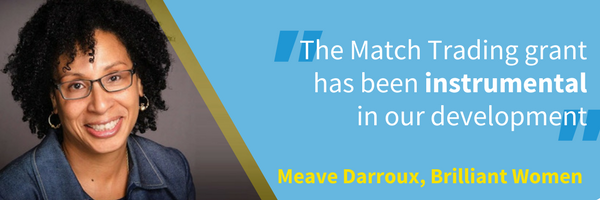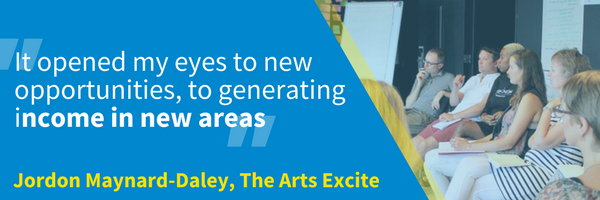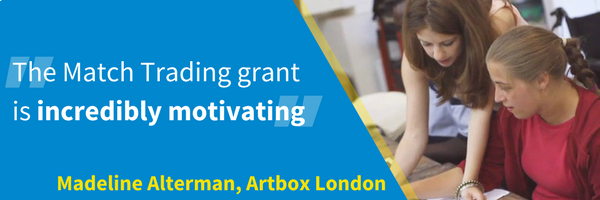Match Trading case studies
Madeline Alterman, Artbox London
Madeline took part in our Match Trading™ pilot, as part of the Lloyds Bank Social Entrepreneurs Trade Up Programme 2015-16, in partnership with SSE and jointly funded by Big Lottery Fund.
What is Artbox London?
Madeline says: “Through our art workshops, exhibitions and trips, Artbox London helps people with learning disabilities feel happier, be more independent, and become more visible and connected within the community. We work with 30 people on a weekly basis but with additional outreach work and providing opportunities for others to take part in our exhibitions, the numbers go into the hundreds.”
What impact did Match Trading have on Artbox London?
- Increased annual trading income: from £6,100 to £15,500 throughout the programme – an increase of 156%.
- A more trading-based model: Trading income accounted for 13% of total income in the baseline year. That increased to 28% by the end of the programme.
- A long-term shift in sustainability: Having been sceptical about trying to pursue a more trading-based model before the programme, Madeline’s board has now set the organisation a target of at least 40% of income coming from trading by 2020.
How did you find Match Trading?
Madeline says: “The Match Trading grant is incredibly motivating. It pushes you to make sure you do what you say you’re going to do, to increase your trading. It’s an incentive to actually follow through with what your aims are, because you want to get the funding.
“Once you’ve got the funding in your bank account, it’s far more flexible than most of the funding we get in as charity. It’s very useful to have relatively unrestricted funding that we could spend on things that would ultimately help us further increase our trading, like marketing. That kind of thing is really hard to get significant funding for otherwise.”
Meave Darroux, Brilliant Women


Meave took part in our Match Trading pilot, as part of the Lloyds Bank Social Entrepreneurs Trade Up Programme 2015-16.
What is Brilliant Women (trading as Brilliant Parents)?
Meave says: “We offer parenting and self-esteem classes in London, working in schools and children’s centres in deprived areas and for women in prisons (e.g. Holloway, which has since closed and, Downview). Brilliant Women was set up in 2002 to promote the development of self-esteem in all those we work with, particularly women in business, providing information, resources and events, in addition to creating a dynamic and mutual network of supporters. At our core, we are a community organisation and a training provider; our programmes impart what we have learnt to those who need it, often in deprived areas and to those who are disadvantaged, but also to those who need empowerment from all areas of society.
“Our parenting programme, Brilliant Parents, launched in 2011. It has helped over 500 families create happier, more harmonious environments for their children giving them a better and positive start in life. Working across London, in Brent, Camden and Harrow, as well as Barking and Dagehnam, Havering and Sutton, Brilliant Parents targets deprived areas and isolated groups such as single parents, communities marginalised by language barriers, and those who are separated from their children. Some of our most recent work has been with: women inmates in Holloway and Downview Prison; young parents living in accommodation provided by Centre Point and on a pilot for NELFT CAMHS Vanguard project to bridge the gap and provide parental support for those parents either awaiting a CAMHS appointment or who do not meet their criteria. ”
What impact did Match Trading have on Brilliant Women?
- Growth in trading income: from £8,600 a year to more than £18,000 – an increase of 111%.
- More balanced income streams: Trading income represented 36% of Meave’s income in the baseline year. By the end of the programme, this had increased to 55%.
- Unlocking entrepreneurialism for sustainable impact: Meave says: “The Match Trading grant has been instrumental in our development, from taking the important decision to create Brilliant Parents as a company in its own right; to now being the sole provider of Triple P Parenting in the London Borough of Hillingdon; to taking a huge leap of faith and moving into offices; and where, one year on [from the programme ending], 100% of our income is via trading!”
How did you find Match Trading?
Meave says: “I had a year to increase my turnover to access the Match Trading grant, so it was about pacing myself. There was no rush to get there, but I knew I couldn’t be too slow. I’m goal-orientated, and I’m quite competitive with myself. So give me a figure and I’ll find a way to meet it!
“I found the Match Trading grant helped me focus, be more targeted, and channel my energies.”
Jordon Maynard-Daley, The Arts Excite


Jordon took part in our Match Trading pilot, as part of the Lloyds Bank Social Entrepreneurs Trade Up Programme 2015-16.
What is The Arts Excite?
“The Arts Excite was an idea I [originally] developed and incubated during my time on the Lloyds Bank Social Entrepreneurs Start Up programme in 2012-13. I then built the project into a community interest company.
“The Arts Excite helps young disadvantaged people fulfil their potential by giving them the confidence, training and experience needed to gain a career in the creative industries. We do this by delivering various creative arts and media workshops, courses, work experience opportunities and social action arts projects. These activities build and develop skills, which hone and harness the creative talents of the beneficiaries we support and are free at the point of delivery. Our work also develops employability, team building, leadership, planning and problem solving skills in young people.
“Many of our beneficiaries have been long term unemployed, ex-offenders or even homeless. We give them access to the best artist tutors, who support them through their projects. These are opportunities they have not had access to since leaving school and this experience gives them something positive to add to and strengthen their CV’s.”
How did you find Match Trading?
“I took part in the pilot year for the Lloyds Bank Social Entrepreneurs Trade Up Programme in 2015-16. In the programme, you are being developed to explore ways of generating income outside of grants.
“The Match Trading grant is different from traditional grant, because for every pound you generate as traded or sales income, you earn another pound as grant.
“I found that motivating, supportive and challenging. I mean ‘challenging’ in a good way, because you have to put a bit of grit into what you’re doing!
“I operate better when I’m held accountable for things. With this programme and the Match Trading grant, I knew I had a deadline. As an entrepreneur, I knew I needed to earn the income by end of programme to access the Match Trading grant on offer. That opened my eyes to spotting new opportunities, to generating income around areas I wouldn’t have looked at otherwise. And that reconfirmed that what we do is worth paying for, and gave me further evidence there’s a demand for it.
“Also, having to do quarterly financial reports [to access the Match Trading grant] helped to keep me on track.”
![]()
![]()
![]()
![]()
![]()
Fiona Frank, Green Elephant Cooperative
Fiona is a student on the Community Business Trade Up Programme 17/18, through which she receives a Match Trading grant.
What is Green Elephant Cooperative?
The Cooperative is a team of people who manage Halton Mill – a co-working space for start-ups, social enterprises, community-based organisations, artists and freelancers in Lancaster.
Fiona says: “Now the space welcomes festivals, music and arts events, workshops, yoga classes and all sorts…It’s not just a shared work-space or events venue. People come here to work then find friends. Many people have told us how it’s relived them from loneliness and isolation, and built relationships among people from different fields.”
How did you find the Match Trading grant?
“The Match Trading grant from the programme gave us the confidence to push forward with the idea [of adult learning classes], because we’ve structured it so we can’t lose money as long as someone comes to those courses. And if they do, we double our revenue.
“It has allowed us to do things we wouldn’t have otherwise done. It’s making us more risk-taking. For example, I saw a great theatre company at the Edinburgh Festival who perform Shakespeare on bicycles! I really wanted them to perform here, but ordinarily we wouldn’t have been able to afford their upfront costs, in case only 30 people came. But I had the confidence to go back and say: you can take more than that if you take everything on the door, up to a higher limit, but we’ll take the rest, and we’ll get the takings from the café.
“I had the confidence to do that because I knew then we wouldn’t lose anything if we didn’t make a penny, but we could double our income from the Match Trading grant if we went for it. My directors are now allowing me to go ahead with that sort of thing.
“The Match Trading grant also means we can hopefully start paying ourselves more fairly for the work we do. At the moment, directors are only being paid for about half the work we do. I already work another job and have a couple of things going on, so I do need to be paid. Now we feel like we can actually pay ourselves, which is very nice! I’m absolutely over the moon with that, and the Match Trading grant is freeing things up for us and really making us excited about the things we’re doing.”
![]()
![]()
![]()
![]()
![]()
Interested in Match Trading™?
For social entrepreneurs: You can access Match Trading grants as part of the Lloyds Bank Social Entrepreneurs Programme, in partnership with SSE and jointly funded by The National Lottery Community Fund, at Trade Up and Scale Up levels.
For organisations interested in the development of Match Trading: SSE is committed to cross-sector collaboration as we develop Match Trading. Please email matchtrading@sse.org.uk if you’d like to find out more about partnering, piloting or funding Match Trading, or for general info.

